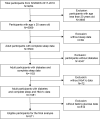Association between weekend catch-up sleep and glycemic control among individuals with diabetes: a population-based study
- PMID: 40538806
- PMCID: PMC12176606
- DOI: 10.3389/fendo.2025.1461367
Association between weekend catch-up sleep and glycemic control among individuals with diabetes: a population-based study
Abstract
Objectives: Weekend catch-up sleep (WCUS), a compensation for insufficient sleep during weekdays, was associated with desirable metabolic effects. However, its relationship with glycemic control among adults with diabetes was not fully established.
Methods: Participants from the 2017-2018 cycle of the National Health and Nutrition Examination Survey were included for analysis. WCUS was defined as a difference in sleep duration between weekends and weekdays of more than one hour. Glycemic control was assessed by hemoglobin A1C (HbA1c) and fasting plasma glucose levels. Poor glycemic control was defined as an HbA1c level exceeding 10.0%.
Results: The final analysis included 571 participants (weighted number: 38,714,135), and 24.90% of them practicing WCUS. No significant association was found between glycemic control and the presence of WCUS. However, significant negative associations were noted between WCUS with a duration of 1-2 hours and HbA1c level [β= -0.82, 95% CI: (-1.34, -0.30), P=0.004] and fasting glucose level [β= -1.67, 95% CI: (-2.51, -0.82), P<0.001] when compared with participants with no WCUS, which remained consistent across different subgroups. In addition, it was also associated with a reduced risk of developing poor glycemic control (OR=0.10, 95% CI: (0.01, 0.60), P=0.015). With WCUS duration of ≥ 2 hours, such associations became not significant.
Conclusions: WCUS for 1-2 hours was associated with lower levels of HbA1c and fasting glucose and reduced risk of developing poor glycemic control, while a duration of ≥ 2 hours was not. Further research is needed to determine the optimal duration of WCUS.
Keywords: blood glucose; diabetes mellitus; glycated hemoglobin; sleep duration; sleep hygiene.
Copyright © 2025 Wang, Li, Yu, Wu, Liu, Zheng, Liu, Yao, Fan and Li.
Conflict of interest statement
The authors declare that the research was conducted in the absence of any commercial or financial relationships that could be construed as a potential conflict of interest.
Figures
Similar articles
-
Association between weekend catch-up sleep and the risk of prediabetes and diabetes: A cross-sectional study using KNHANES.J Psychosom Res. 2024 Apr;179:111618. doi: 10.1016/j.jpsychores.2024.111618. Epub 2024 Feb 20. J Psychosom Res. 2024. PMID: 38412653
-
Association of Weekend Catch-Up Sleep With the Triglyceride/High-Density Lipoprotein Cholesterol Ratio.Cureus. 2025 Jun 5;17(6):e85429. doi: 10.7759/cureus.85429. eCollection 2025 Jun. Cureus. 2025. PMID: 40621237 Free PMC article.
-
Treatment of periodontitis for glycaemic control in people with diabetes mellitus.Cochrane Database Syst Rev. 2022 Apr 14;4(4):CD004714. doi: 10.1002/14651858.CD004714.pub4. Cochrane Database Syst Rev. 2022. PMID: 35420698 Free PMC article.
-
Home treatment for mental health problems: a systematic review.Health Technol Assess. 2001;5(15):1-139. doi: 10.3310/hta5150. Health Technol Assess. 2001. PMID: 11532236
-
Association of weekend catch-up sleep with the atherosclerotic cardiovascular disease risk score: a hypothesis-generating study from U.S. and Korean National Health and Nutrition Examination Survey.J Clin Sleep Med. 2025 Jul 31. doi: 10.5664/jcsm.11844. Online ahead of print. J Clin Sleep Med. 2025. PMID: 40742144
References
-
- Watson NF, Badr MS, Belenky G, Bliwise DL, Buxton OM, Buysse D, et al. Joint consensus statement of the American academy of sleep medicine and sleep research society on the recommended amount of sleep for a healthy adult: methodology and discussion. Sleep. (2015) 38:1161–83. doi: 10.5665/sleep.4886 - DOI - PMC - PubMed
MeSH terms
Substances
LinkOut - more resources
Full Text Sources
Medical



